Spring 2019 Literature Review: Minimum Wages and Employee Motivation
VerifiedAdded on 2022/11/13
|6
|1316
|196
Report
AI Summary
This literature review examines the relationship between minimum wages and employee motivation, drawing on peer-reviewed articles to analyze how wages impact job satisfaction, commitment, and overall performance. The report discusses the findings of Umar (2014), Sule, Amuni, Obasan, & Banjo (2015), and Khalid & Khalid (2012), highlighting that adequate compensation is a key driver of employee motivation, while low wages often lead to decreased motivation, absenteeism, and a higher likelihood of employees seeking alternative employment. The review explores the implications of these findings for organizations aiming to enhance employee engagement and achieve long-term success, emphasizing the importance of competitive wages and benefits as essential tools for fostering a motivated and productive workforce. The report also touches upon Herzberg's Two-Factor theory and the importance of providing additional benefits like good working conditions and effective employer-employee relationships, especially for organizations offering minimum wages, to boost employee motivation and job satisfaction.
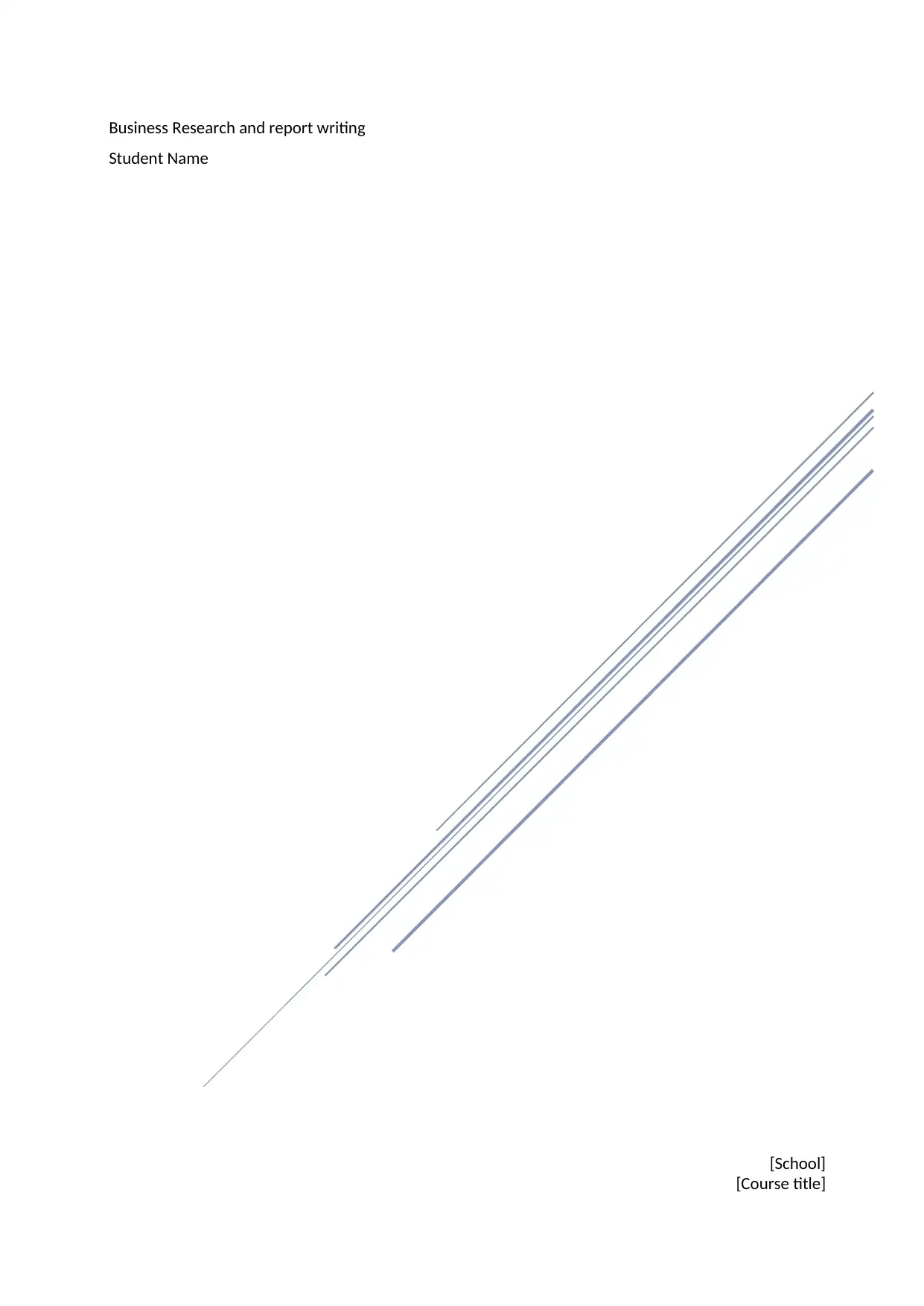
[School]
[Course title]
Business Research and report writing
Student Name
[Course title]
Business Research and report writing
Student Name
Paraphrase This Document
Need a fresh take? Get an instant paraphrase of this document with our AI Paraphraser
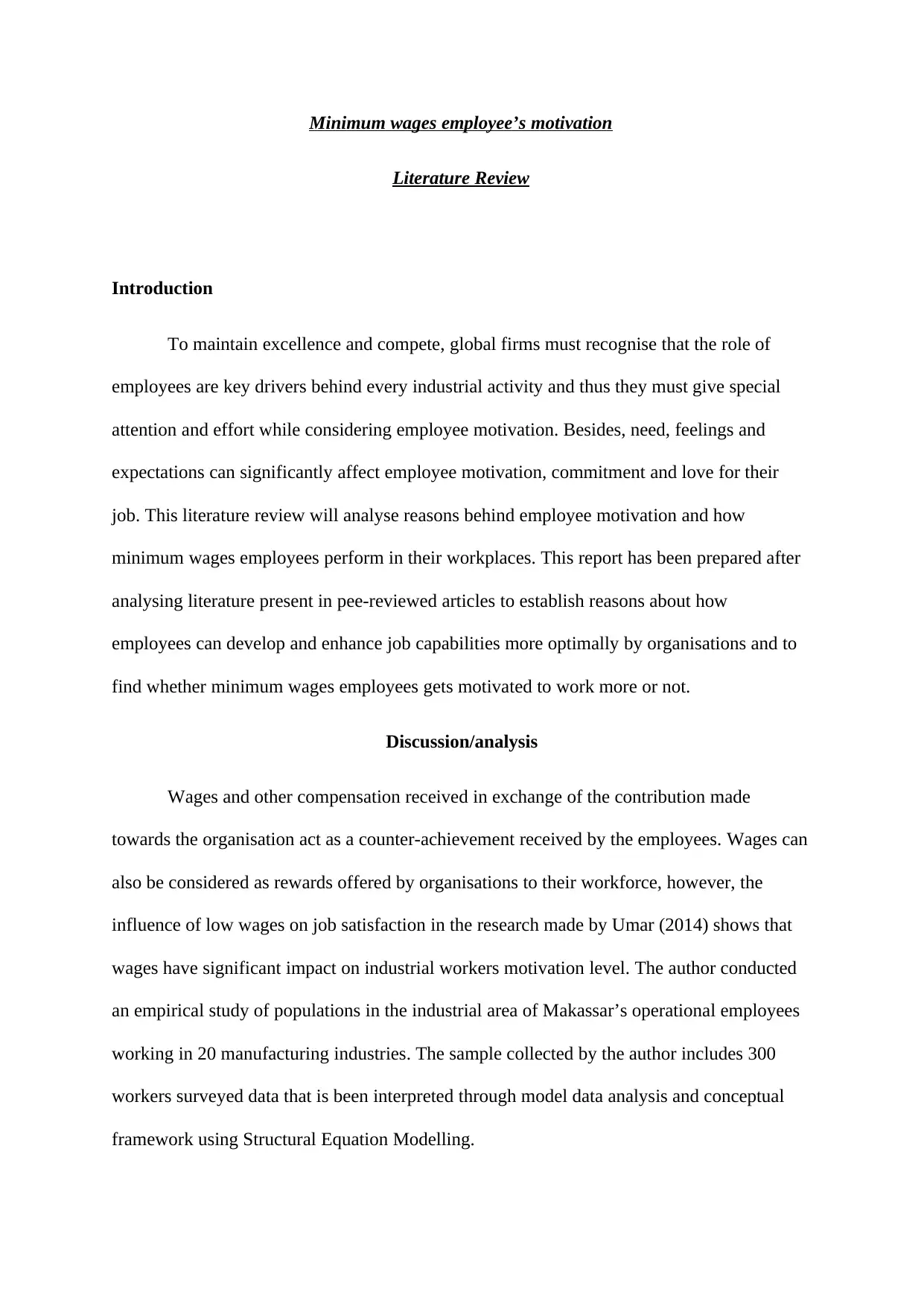
Minimum wages employee’s motivation
Literature Review
Introduction
To maintain excellence and compete, global firms must recognise that the role of
employees are key drivers behind every industrial activity and thus they must give special
attention and effort while considering employee motivation. Besides, need, feelings and
expectations can significantly affect employee motivation, commitment and love for their
job. This literature review will analyse reasons behind employee motivation and how
minimum wages employees perform in their workplaces. This report has been prepared after
analysing literature present in pee-reviewed articles to establish reasons about how
employees can develop and enhance job capabilities more optimally by organisations and to
find whether minimum wages employees gets motivated to work more or not.
Discussion/analysis
Wages and other compensation received in exchange of the contribution made
towards the organisation act as a counter-achievement received by the employees. Wages can
also be considered as rewards offered by organisations to their workforce, however, the
influence of low wages on job satisfaction in the research made by Umar (2014) shows that
wages have significant impact on industrial workers motivation level. The author conducted
an empirical study of populations in the industrial area of Makassar’s operational employees
working in 20 manufacturing industries. The sample collected by the author includes 300
workers surveyed data that is been interpreted through model data analysis and conceptual
framework using Structural Equation Modelling.
Literature Review
Introduction
To maintain excellence and compete, global firms must recognise that the role of
employees are key drivers behind every industrial activity and thus they must give special
attention and effort while considering employee motivation. Besides, need, feelings and
expectations can significantly affect employee motivation, commitment and love for their
job. This literature review will analyse reasons behind employee motivation and how
minimum wages employees perform in their workplaces. This report has been prepared after
analysing literature present in pee-reviewed articles to establish reasons about how
employees can develop and enhance job capabilities more optimally by organisations and to
find whether minimum wages employees gets motivated to work more or not.
Discussion/analysis
Wages and other compensation received in exchange of the contribution made
towards the organisation act as a counter-achievement received by the employees. Wages can
also be considered as rewards offered by organisations to their workforce, however, the
influence of low wages on job satisfaction in the research made by Umar (2014) shows that
wages have significant impact on industrial workers motivation level. The author conducted
an empirical study of populations in the industrial area of Makassar’s operational employees
working in 20 manufacturing industries. The sample collected by the author includes 300
workers surveyed data that is been interpreted through model data analysis and conceptual
framework using Structural Equation Modelling.
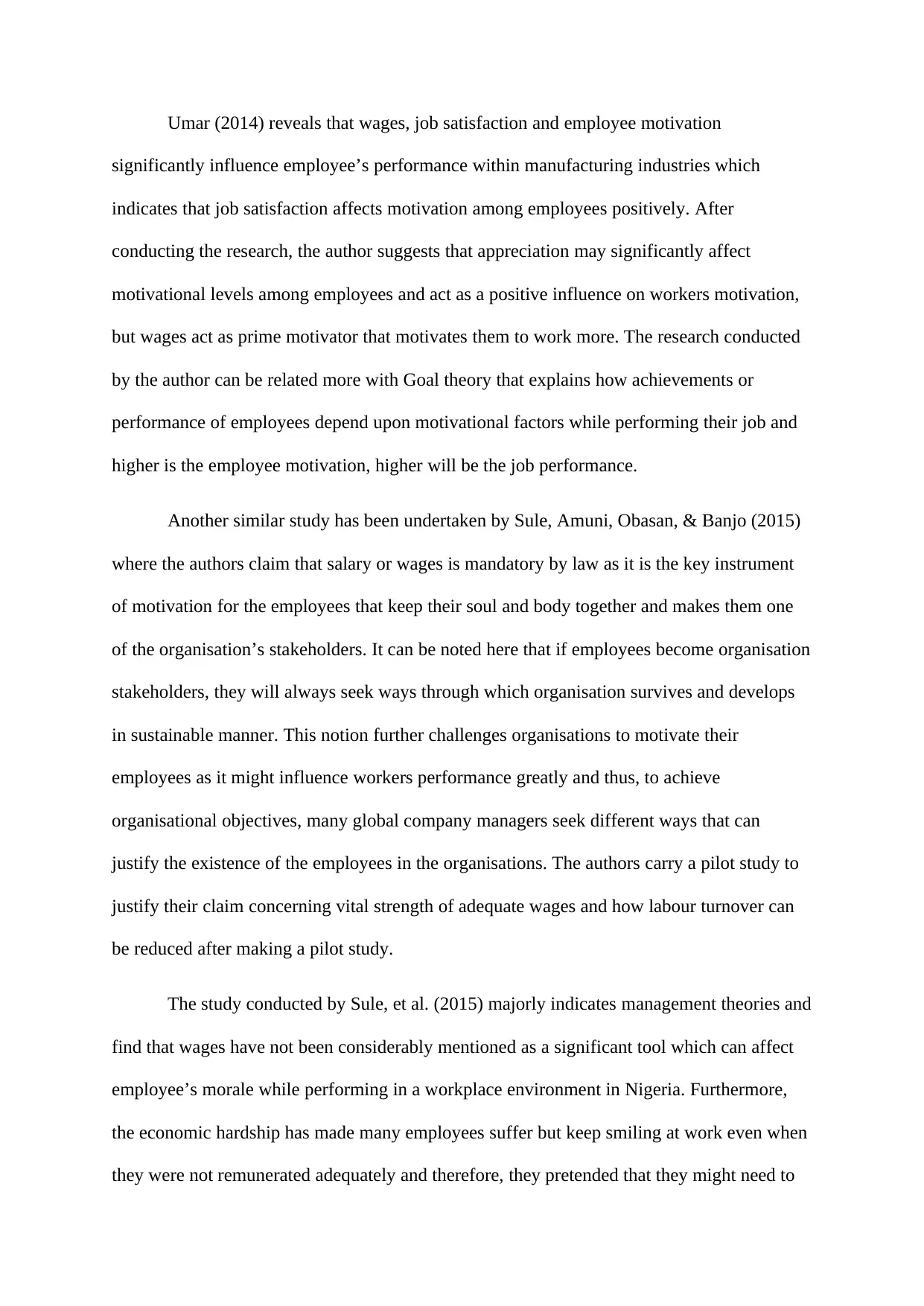
Umar (2014) reveals that wages, job satisfaction and employee motivation
significantly influence employee’s performance within manufacturing industries which
indicates that job satisfaction affects motivation among employees positively. After
conducting the research, the author suggests that appreciation may significantly affect
motivational levels among employees and act as a positive influence on workers motivation,
but wages act as prime motivator that motivates them to work more. The research conducted
by the author can be related more with Goal theory that explains how achievements or
performance of employees depend upon motivational factors while performing their job and
higher is the employee motivation, higher will be the job performance.
Another similar study has been undertaken by Sule, Amuni, Obasan, & Banjo (2015)
where the authors claim that salary or wages is mandatory by law as it is the key instrument
of motivation for the employees that keep their soul and body together and makes them one
of the organisation’s stakeholders. It can be noted here that if employees become organisation
stakeholders, they will always seek ways through which organisation survives and develops
in sustainable manner. This notion further challenges organisations to motivate their
employees as it might influence workers performance greatly and thus, to achieve
organisational objectives, many global company managers seek different ways that can
justify the existence of the employees in the organisations. The authors carry a pilot study to
justify their claim concerning vital strength of adequate wages and how labour turnover can
be reduced after making a pilot study.
The study conducted by Sule, et al. (2015) majorly indicates management theories and
find that wages have not been considerably mentioned as a significant tool which can affect
employee’s morale while performing in a workplace environment in Nigeria. Furthermore,
the economic hardship has made many employees suffer but keep smiling at work even when
they were not remunerated adequately and therefore, they pretended that they might need to
significantly influence employee’s performance within manufacturing industries which
indicates that job satisfaction affects motivation among employees positively. After
conducting the research, the author suggests that appreciation may significantly affect
motivational levels among employees and act as a positive influence on workers motivation,
but wages act as prime motivator that motivates them to work more. The research conducted
by the author can be related more with Goal theory that explains how achievements or
performance of employees depend upon motivational factors while performing their job and
higher is the employee motivation, higher will be the job performance.
Another similar study has been undertaken by Sule, Amuni, Obasan, & Banjo (2015)
where the authors claim that salary or wages is mandatory by law as it is the key instrument
of motivation for the employees that keep their soul and body together and makes them one
of the organisation’s stakeholders. It can be noted here that if employees become organisation
stakeholders, they will always seek ways through which organisation survives and develops
in sustainable manner. This notion further challenges organisations to motivate their
employees as it might influence workers performance greatly and thus, to achieve
organisational objectives, many global company managers seek different ways that can
justify the existence of the employees in the organisations. The authors carry a pilot study to
justify their claim concerning vital strength of adequate wages and how labour turnover can
be reduced after making a pilot study.
The study conducted by Sule, et al. (2015) majorly indicates management theories and
find that wages have not been considerably mentioned as a significant tool which can affect
employee’s morale while performing in a workplace environment in Nigeria. Furthermore,
the economic hardship has made many employees suffer but keep smiling at work even when
they were not remunerated adequately and therefore, they pretended that they might need to
⊘ This is a preview!⊘
Do you want full access?
Subscribe today to unlock all pages.

Trusted by 1+ million students worldwide
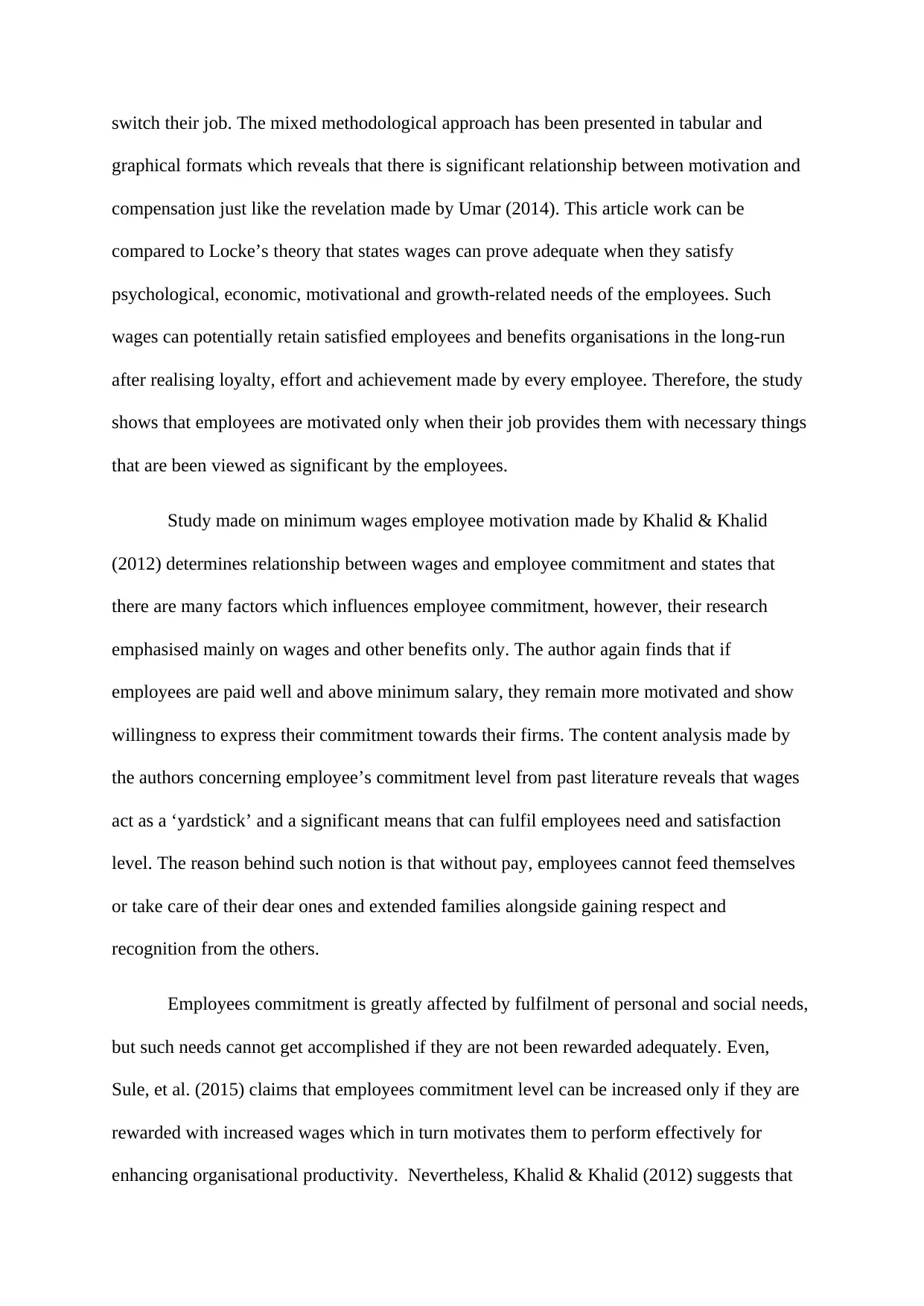
switch their job. The mixed methodological approach has been presented in tabular and
graphical formats which reveals that there is significant relationship between motivation and
compensation just like the revelation made by Umar (2014). This article work can be
compared to Locke’s theory that states wages can prove adequate when they satisfy
psychological, economic, motivational and growth-related needs of the employees. Such
wages can potentially retain satisfied employees and benefits organisations in the long-run
after realising loyalty, effort and achievement made by every employee. Therefore, the study
shows that employees are motivated only when their job provides them with necessary things
that are been viewed as significant by the employees.
Study made on minimum wages employee motivation made by Khalid & Khalid
(2012) determines relationship between wages and employee commitment and states that
there are many factors which influences employee commitment, however, their research
emphasised mainly on wages and other benefits only. The author again finds that if
employees are paid well and above minimum salary, they remain more motivated and show
willingness to express their commitment towards their firms. The content analysis made by
the authors concerning employee’s commitment level from past literature reveals that wages
act as a ‘yardstick’ and a significant means that can fulfil employees need and satisfaction
level. The reason behind such notion is that without pay, employees cannot feed themselves
or take care of their dear ones and extended families alongside gaining respect and
recognition from the others.
Employees commitment is greatly affected by fulfilment of personal and social needs,
but such needs cannot get accomplished if they are not been rewarded adequately. Even,
Sule, et al. (2015) claims that employees commitment level can be increased only if they are
rewarded with increased wages which in turn motivates them to perform effectively for
enhancing organisational productivity. Nevertheless, Khalid & Khalid (2012) suggests that
graphical formats which reveals that there is significant relationship between motivation and
compensation just like the revelation made by Umar (2014). This article work can be
compared to Locke’s theory that states wages can prove adequate when they satisfy
psychological, economic, motivational and growth-related needs of the employees. Such
wages can potentially retain satisfied employees and benefits organisations in the long-run
after realising loyalty, effort and achievement made by every employee. Therefore, the study
shows that employees are motivated only when their job provides them with necessary things
that are been viewed as significant by the employees.
Study made on minimum wages employee motivation made by Khalid & Khalid
(2012) determines relationship between wages and employee commitment and states that
there are many factors which influences employee commitment, however, their research
emphasised mainly on wages and other benefits only. The author again finds that if
employees are paid well and above minimum salary, they remain more motivated and show
willingness to express their commitment towards their firms. The content analysis made by
the authors concerning employee’s commitment level from past literature reveals that wages
act as a ‘yardstick’ and a significant means that can fulfil employees need and satisfaction
level. The reason behind such notion is that without pay, employees cannot feed themselves
or take care of their dear ones and extended families alongside gaining respect and
recognition from the others.
Employees commitment is greatly affected by fulfilment of personal and social needs,
but such needs cannot get accomplished if they are not been rewarded adequately. Even,
Sule, et al. (2015) claims that employees commitment level can be increased only if they are
rewarded with increased wages which in turn motivates them to perform effectively for
enhancing organisational productivity. Nevertheless, Khalid & Khalid (2012) suggests that
Paraphrase This Document
Need a fresh take? Get an instant paraphrase of this document with our AI Paraphraser
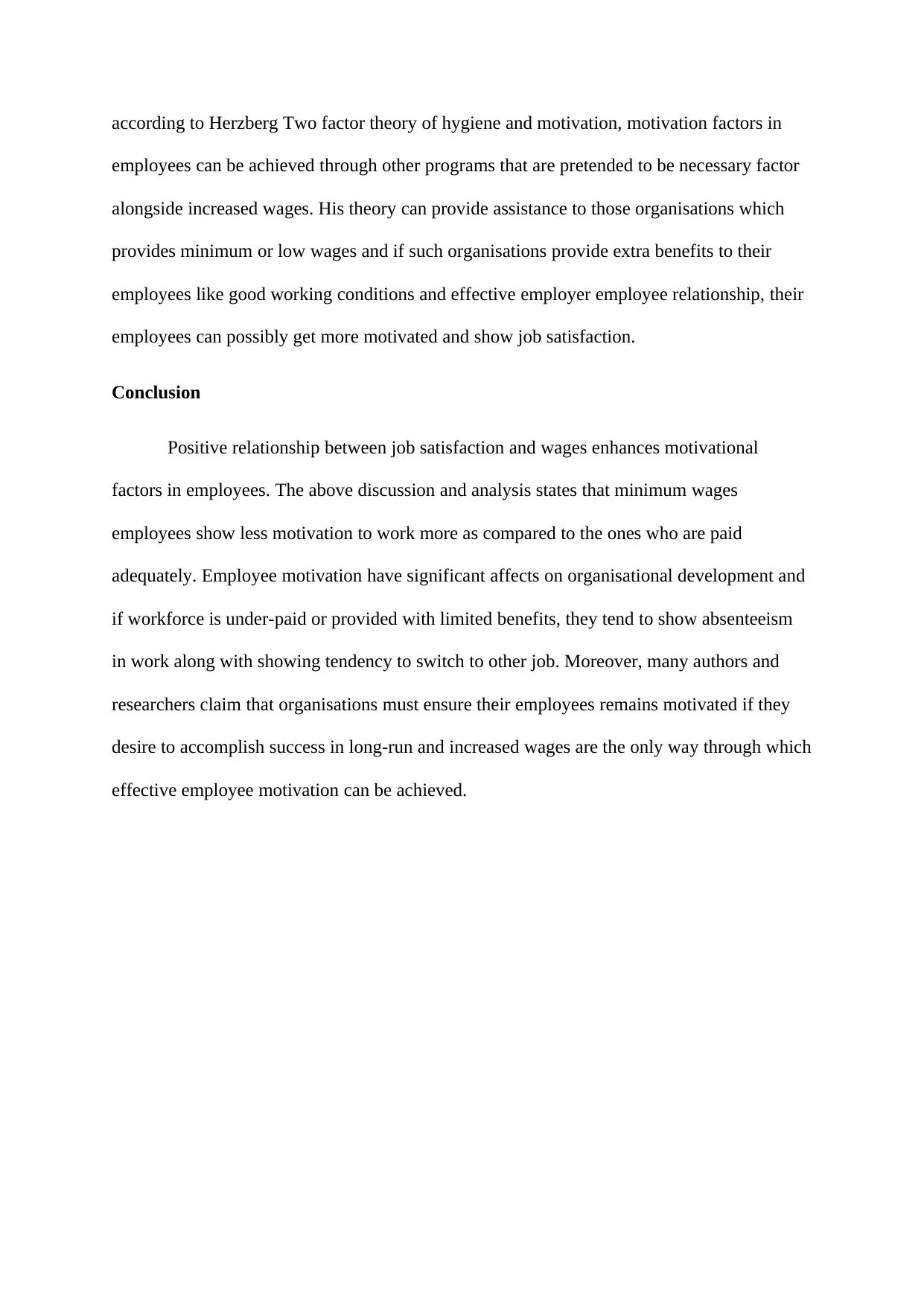
according to Herzberg Two factor theory of hygiene and motivation, motivation factors in
employees can be achieved through other programs that are pretended to be necessary factor
alongside increased wages. His theory can provide assistance to those organisations which
provides minimum or low wages and if such organisations provide extra benefits to their
employees like good working conditions and effective employer employee relationship, their
employees can possibly get more motivated and show job satisfaction.
Conclusion
Positive relationship between job satisfaction and wages enhances motivational
factors in employees. The above discussion and analysis states that minimum wages
employees show less motivation to work more as compared to the ones who are paid
adequately. Employee motivation have significant affects on organisational development and
if workforce is under-paid or provided with limited benefits, they tend to show absenteeism
in work along with showing tendency to switch to other job. Moreover, many authors and
researchers claim that organisations must ensure their employees remains motivated if they
desire to accomplish success in long-run and increased wages are the only way through which
effective employee motivation can be achieved.
employees can be achieved through other programs that are pretended to be necessary factor
alongside increased wages. His theory can provide assistance to those organisations which
provides minimum or low wages and if such organisations provide extra benefits to their
employees like good working conditions and effective employer employee relationship, their
employees can possibly get more motivated and show job satisfaction.
Conclusion
Positive relationship between job satisfaction and wages enhances motivational
factors in employees. The above discussion and analysis states that minimum wages
employees show less motivation to work more as compared to the ones who are paid
adequately. Employee motivation have significant affects on organisational development and
if workforce is under-paid or provided with limited benefits, they tend to show absenteeism
in work along with showing tendency to switch to other job. Moreover, many authors and
researchers claim that organisations must ensure their employees remains motivated if they
desire to accomplish success in long-run and increased wages are the only way through which
effective employee motivation can be achieved.
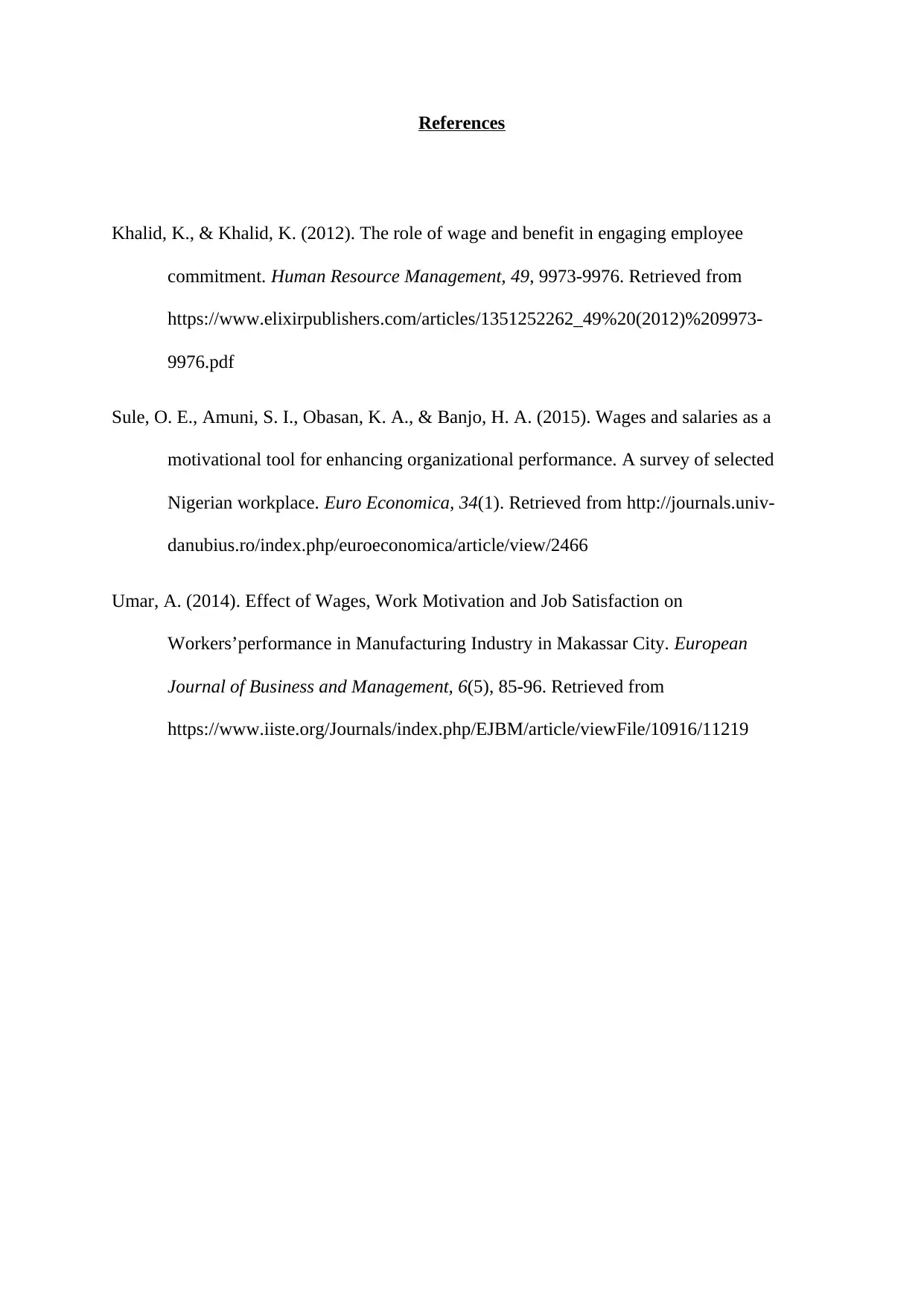
References
Khalid, K., & Khalid, K. (2012). The role of wage and benefit in engaging employee
commitment. Human Resource Management, 49, 9973-9976. Retrieved from
https://www.elixirpublishers.com/articles/1351252262_49%20(2012)%209973-
9976.pdf
Sule, O. E., Amuni, S. I., Obasan, K. A., & Banjo, H. A. (2015). Wages and salaries as a
motivational tool for enhancing organizational performance. A survey of selected
Nigerian workplace. Euro Economica, 34(1). Retrieved from http://journals.univ-
danubius.ro/index.php/euroeconomica/article/view/2466
Umar, A. (2014). Effect of Wages, Work Motivation and Job Satisfaction on
Workers’performance in Manufacturing Industry in Makassar City. European
Journal of Business and Management, 6(5), 85-96. Retrieved from
https://www.iiste.org/Journals/index.php/EJBM/article/viewFile/10916/11219
Khalid, K., & Khalid, K. (2012). The role of wage and benefit in engaging employee
commitment. Human Resource Management, 49, 9973-9976. Retrieved from
https://www.elixirpublishers.com/articles/1351252262_49%20(2012)%209973-
9976.pdf
Sule, O. E., Amuni, S. I., Obasan, K. A., & Banjo, H. A. (2015). Wages and salaries as a
motivational tool for enhancing organizational performance. A survey of selected
Nigerian workplace. Euro Economica, 34(1). Retrieved from http://journals.univ-
danubius.ro/index.php/euroeconomica/article/view/2466
Umar, A. (2014). Effect of Wages, Work Motivation and Job Satisfaction on
Workers’performance in Manufacturing Industry in Makassar City. European
Journal of Business and Management, 6(5), 85-96. Retrieved from
https://www.iiste.org/Journals/index.php/EJBM/article/viewFile/10916/11219
⊘ This is a preview!⊘
Do you want full access?
Subscribe today to unlock all pages.

Trusted by 1+ million students worldwide
1 out of 6
Related Documents
Your All-in-One AI-Powered Toolkit for Academic Success.
+13062052269
info@desklib.com
Available 24*7 on WhatsApp / Email
![[object Object]](/_next/static/media/star-bottom.7253800d.svg)
Unlock your academic potential
Copyright © 2020–2026 A2Z Services. All Rights Reserved. Developed and managed by ZUCOL.





